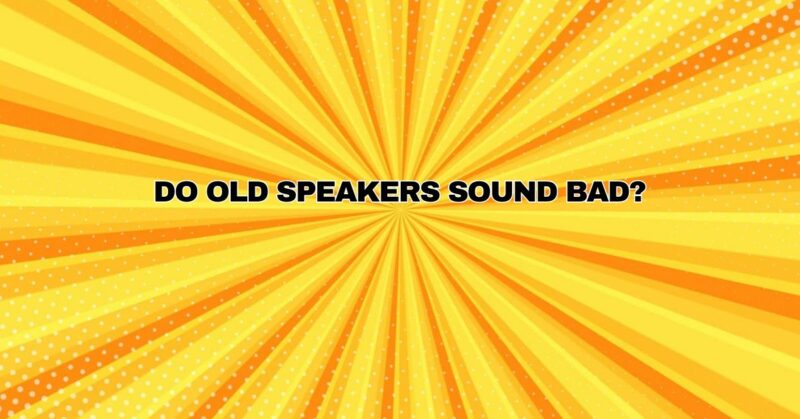The world of audio equipment is a fascinating realm, with a rich history spanning decades. Vintage speakers, which were once considered state-of-the-art, have made a resurgence in recent years. However, a common misconception persists: that old speakers inherently sound bad. In this comprehensive article, we will explore the truth behind this notion, examine the factors that influence the sound quality of vintage speakers, and discuss whether old speakers should be dismissed as poor performers.
The Myth of “Old Equals Bad”
The idea that old speakers sound bad is based on several misconceptions:
- Technological Advances: Some argue that modern speakers have advanced in terms of materials, design, and engineering, rendering older speakers obsolete. While it’s true that technology has evolved, it doesn’t necessarily mean older speakers are incapable of delivering quality sound.
- Wear and Tear: Vintage speakers may indeed exhibit signs of wear and tear, such as deteriorating foam surrounds or damaged components. However, these issues are not inherent to all old speakers and can often be remedied through maintenance and restoration.
- Comparative Bias: Listeners often compare vintage speakers directly with modern counterparts, expecting the same characteristics. Vintage speakers may have unique sound signatures that are different from today’s speakers but not necessarily inferior.
- Nostalgia vs. Objectivity: Nostalgia can cloud judgment. Some people may prefer the sound of vintage speakers because it reminds them of a specific era or personal memories. However, personal preference does not equate to objective sound quality.
Factors Influencing Sound Quality in Vintage Speakers
To assess whether old speakers sound bad, it’s essential to consider the factors that influence their sound quality:
- Build Quality: High-end vintage speakers from reputable manufacturers often featured superb craftsmanship and quality components. These speakers were built to last and maintain their performance over time.
- Materials: The materials used in speaker construction play a crucial role in sound quality. Vintage speakers may utilize solid wood cabinets and high-quality driver components, contributing to their unique sonic characteristics.
- Maintenance: The condition of vintage speakers greatly depends on how well they have been maintained over the years. Regular maintenance, including refoaming of surrounds, cleaning of drivers, and replacing deteriorated parts, can extend their lifespan and performance.
- Design and Engineering: Vintage speakers from well-known brands often went through meticulous engineering and design processes. These factors contributed to their sound characteristics and overall performance.
- Room Acoustics: The acoustics of the room in which vintage speakers are placed can significantly impact sound quality. Proper placement and room treatment can enhance the performance of old speakers.
- Matching Equipment: Vintage speakers may benefit from amplifiers and source components that are compatible with their unique characteristics. The right combination of equipment can bring out the best in vintage speakers.
The Truth About Vintage Speaker Sound Quality
The truth about vintage speaker sound quality is nuanced:
- Unique Sound Signatures: Vintage speakers often have unique sound signatures that may not align with modern preferences. Some listeners appreciate the warm, analog sound produced by vintage speakers, while others may prefer the precision and neutrality of modern speakers.
- Maintenance Matters: The condition of vintage speakers is a critical factor in their sound quality. Well-maintained vintage speakers can sound excellent, while neglected ones may exhibit performance issues.
- Personal Preference: Sound quality is subjective, and personal preference plays a significant role. Some individuals may prefer the vintage sound characteristics, while others may gravitate toward modern audio aesthetics.
- Restoration Potential: Vintage speakers can often be restored to their original glory with the right care and attention. This restoration process can result in speakers that sound as good as, if not better than, when they were new.
Conclusion
The notion that old speakers inherently sound bad is a misconception that fails to consider the myriad factors influencing sound quality. While some vintage speakers may exhibit issues due to neglect or wear and tear, many others, especially those from reputable manufacturers, can deliver excellent sound when properly maintained and matched with compatible equipment.
Ultimately, whether old speakers sound bad is a matter of individual preference, room acoustics, and the specific vintage speakers in question. The world of audio offers a vast array of options, and both vintage and modern speakers have their unique qualities and appeal. Therefore, it’s essential to approach the evaluation of vintage speakers with an open mind, recognizing that they can offer a distinctive and enjoyable listening experience for those who appreciate their characteristics.


